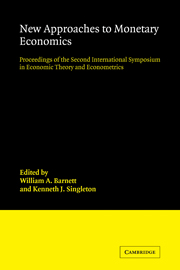 New Approaches to Monetary Economics
New Approaches to Monetary Economics Book contents
- Frontmatter
- Contents
- Editors' introduction
- List of contributors
- Part I Transactions motivated monetary holdings in general equilibrium
- Part II Financial intermediation
- Part III Monetary aggregation theory
- 6 The microeconomic theory of monetary aggregation
- 7 Monetary asset separability tests
- 8 Money demand in open economies: a Divisia application to the U.S. case
- 9 Aggregation of monetary goods: a production model
- 10 Money in the utility function: an empirical implementation
- 11 Comment on papers in Part III
- Part IV Issues on aggregate fluctuations
- Part V Theoretical issues in the foundations of monetary economics and macroeconomics
8 - Money demand in open economies: a Divisia application to the U.S. case
Published online by Cambridge University Press: 04 August 2010
- Frontmatter
- Contents
- Editors' introduction
- List of contributors
- Part I Transactions motivated monetary holdings in general equilibrium
- Part II Financial intermediation
- Part III Monetary aggregation theory
- 6 The microeconomic theory of monetary aggregation
- 7 Monetary asset separability tests
- 8 Money demand in open economies: a Divisia application to the U.S. case
- 9 Aggregation of monetary goods: a production model
- 10 Money in the utility function: an empirical implementation
- 11 Comment on papers in Part III
- Part IV Issues on aggregate fluctuations
- Part V Theoretical issues in the foundations of monetary economics and macroeconomics
Summary
Abstract: Knowledge of the extent to which monies of different countries can substitute for each other is important for the design and implementation of monetary policy. However, existing empirical analyses of money demand in open economies rest on official estimates of money holdings that imply an infinite elasticity of substitution among different monetary assets. Existing analyses of Divisia monetary aggregates do not impose such an assumption, but do not allow foreign exchange considerations. This paper combines both approaches into a unified explanation of domestic money holdings. The empirical analysis suggests that U.S. Divisia money holdings are influenced by foreign exchange considerations. Foreign monetary policies, through their effects on both foreign interest and exchange rates, might influence domestic monetary policy directly via currency substitution.
Introduction
The purpose of this paper is to determine whether domestic money holdings are influenced by foreign exchange considerations, an influence generally known as currency substitution. Intuitively, one would expect such considerations to influence holdings of domestic money, given the increased integration of international markets and the interdependency of asset holdings. As a result, changes in either foreign interest rates or exchange rates should induce changes in the optimal portfolio mix with a corresponding impact on domestic money holdings.
Knowledge of whether currency substitution exists is important for the design and implementation of monetary policy for several reasons. First, the intended effect of an open-market operation will not materialize if offsetting portfolio changes take place through currency substitution.
- Type
- Chapter
- Information
- New Approaches to Monetary EconomicsProceedings of the Second International Symposium in Economic Theory and Econometrics, pp. 183 - 199Publisher: Cambridge University PressPrint publication year: 1987
- 2
- Cited by
